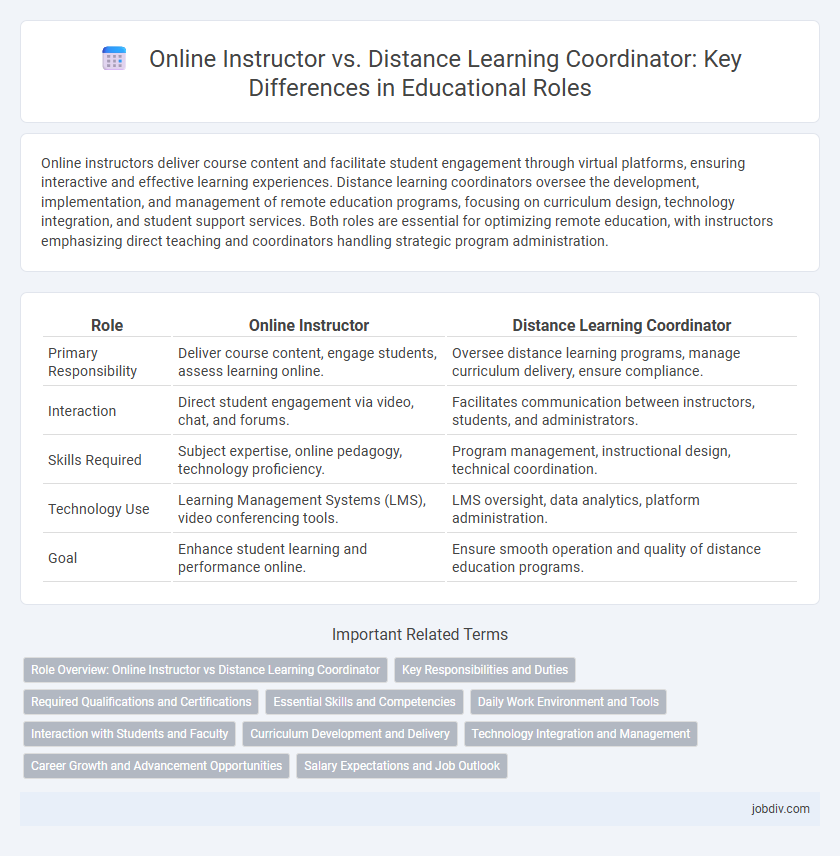Online instructors deliver course content and facilitate student engagement through virtual platforms, ensuring interactive and effective learning experiences. Distance learning coordinators oversee the development, implementation, and management of remote education programs, focusing on curriculum design, technology integration, and student support services. Both roles are essential for optimizing remote education, with instructors emphasizing direct teaching and coordinators handling strategic program administration.
Table of Comparison
| Role | Online Instructor | Distance Learning Coordinator |
|---|---|---|
| Primary Responsibility | Deliver course content, engage students, assess learning online. | Oversee distance learning programs, manage curriculum delivery, ensure compliance. |
| Interaction | Direct student engagement via video, chat, and forums. | Facilitates communication between instructors, students, and administrators. |
| Skills Required | Subject expertise, online pedagogy, technology proficiency. | Program management, instructional design, technical coordination. |
| Technology Use | Learning Management Systems (LMS), video conferencing tools. | LMS oversight, data analytics, platform administration. |
| Goal | Enhance student learning and performance online. | Ensure smooth operation and quality of distance education programs. |
Role Overview: Online Instructor vs Distance Learning Coordinator
An Online Instructor primarily delivers course content, engages students through virtual platforms, and assesses learner progress in real time. A Distance Learning Coordinator manages the design, implementation, and administration of online education programs, ensuring technology integration and compliance with academic standards. Both roles contribute to remote education success, with the instructor focusing on direct teaching and the coordinator overseeing program logistics.
Key Responsibilities and Duties
Online instructors design and deliver curriculum through virtual platforms, focusing on student engagement, assessments, and real-time feedback. Distance learning coordinators manage the operational aspects of remote education programs, including scheduling, technology integration, and compliance with accreditation standards. Both roles require expertise in digital tools, but instructors prioritize content delivery while coordinators emphasize program logistics and student support services.
Required Qualifications and Certifications
Online instructors typically require a bachelor's degree in education or a subject-specific field, along with teaching certifications such as a state license or Professional Teaching Certificate (PTC). Distance learning coordinators often hold a master's degree in educational technology, instructional design, or administration, with certifications like Certified Online Learning Facilitator (COLF) or Project Management Professional (PMP) being advantageous. Both roles demand strong technological proficiency, with the coordinator position emphasizing expertise in learning management systems (LMS) and program development.
Essential Skills and Competencies
Online Instructors require strong digital communication skills, proficiency in virtual classroom technologies, and the ability to design engaging, interactive content tailored for remote learners. Distance Learning Coordinators must excel in program management, curriculum development, and data analysis to optimize course delivery and ensure compliance with accreditation standards. Both roles demand adaptability, problem-solving abilities, and a deep understanding of online pedagogical strategies to enhance student outcomes.
Daily Work Environment and Tools
Online Instructors typically engage with virtual classrooms using learning management systems (LMS) such as Canvas or Blackboard to deliver lectures, assess student progress, and provide feedback in real-time. Distance Learning Coordinators manage course logistics, align curriculum across platforms, and oversee technology integration, often utilizing project management tools like Trello or Asana to coordinate faculty and maintain quality standards. Both roles rely heavily on communication tools like Zoom and email, but instructors focus more on pedagogical interaction while coordinators concentrate on administrative and operational efficiency.
Interaction with Students and Faculty
Online instructors engage directly with students through virtual classrooms, providing real-time feedback and fostering interactive discussions to enhance learning outcomes. Distance Learning Coordinators facilitate communication between faculty and students by managing course logistics, ensuring accessibility, and resolving academic issues efficiently. Both roles emphasize student support, but instructors prioritize personalized teaching, while coordinators focus on maintaining program coherence and administrative interaction.
Curriculum Development and Delivery
An Online Instructor specializes in delivering course content and facilitating student engagement through digital platforms, directly influencing curriculum delivery and adapting materials for interactive learning environments. A Distance Learning Coordinator oversees the design and implementation of comprehensive distance education programs, ensuring curriculum alignment with institutional standards and integrating technological tools for effective content distribution. Both roles collaborate to optimize curriculum development and delivery, enhancing accessibility and educational outcomes in remote learning settings.
Technology Integration and Management
Online Instructors leverage digital platforms and learning management systems to deliver interactive content and assess student progress in real-time. Distance Learning Coordinators oversee the implementation of technology infrastructure, ensuring seamless communication between students and instructors while managing technical support and course scheduling. Both roles require expertise in educational technologies, but instructors prioritize pedagogical integration, whereas coordinators focus on operational technology management.
Career Growth and Advancement Opportunities
Online Instructors gain career growth through skill enhancement in digital pedagogy and direct student engagement, often progressing to curriculum design or educational technology roles. Distance Learning Coordinators advance by managing program development, ensuring compliance, and leading teams, positioning them for administrative leadership or higher education management. Both pathways offer distinct advancement opportunities by leveraging expertise in online education infrastructure and instructional strategies.
Salary Expectations and Job Outlook
Online Instructors typically earn between $45,000 and $70,000 annually, with job growth expected at 12% over the next decade due to increasing demand for virtual education. Distance Learning Coordinators command higher salaries, ranging from $55,000 to $85,000, driven by the increasing complexity of managing online programs and technological integration. Employment opportunities for Distance Learning Coordinators are projected to grow by 10%, reflecting the expanding need for skilled administrators in remote education systems.
Online Instructor vs Distance Learning Coordinator Infographic

 jobdiv.com
jobdiv.com